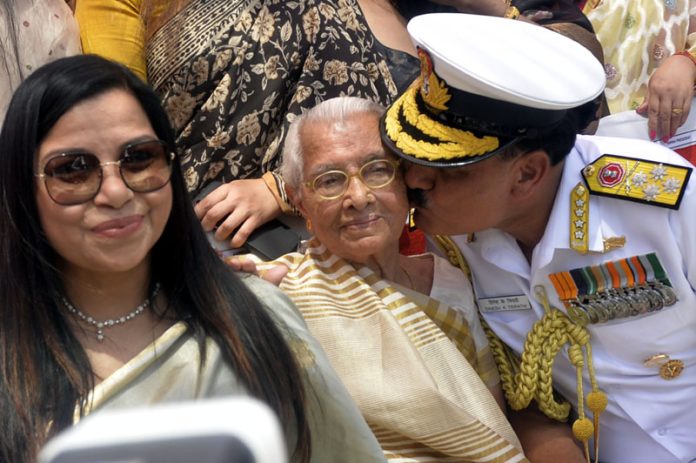
NEW DELHI, Apr 30: Shortly after assuming charge as the 26th Chief of the Naval Staff, Admiral Dinesh Kumar Tripathi on Tuesday said the Navy should remain operationally ready at all times to deter potential adversaries in view of the emerging challenges in the maritime domain.
Admiral Tripathi, regarded as a communication and electronic warfare specialist, took the reins of the force following the retirement of incumbent R Hari Kumar after a career spanning four decades.
An alumnus of the Sainik School Rewa, Admiral Tripathi was serving as the Vice Chief of the Naval Staff.
The admiral took charge of the Navy at a time when various strategic waterways, including the Red Sea and the Gulf of Aden, were witnessing security challenges, especially with Houthi militants targeting merchant ships in the region.
“Over the years, our Navy has evolved into a combat-ready, cohesive, credible, and future-proof force, for which I want to thank all the esteemed former Chiefs of the Navy,” he told reporters.
“The existing and emerging challenges in the maritime domain mandate the Indian Navy to remain operationally ready to deter potential adversities at sea in peace and to win the war at sea when asked to do so,” he said.
“That will remain my singular focus and endeavour,” the new Navy Chief said.
Besides the situation in the Red Sea, there have been growing concerns in India’s security establishment over China’s increasing forays into the Indian Ocean Region.
“I will also strengthen the ongoing efforts of the Indian Navy towards ‘Aatmanirbharta’ (self-reliance), towards new technologies and becoming an important pillar of the nation’s development towards our collective quest for ‘Viksit Bharat’,” he said.
Admiral Tripathi said he will also focus on issues relating to the force’s human resources.
“My priority will be to upskill our human resource that is the men and women of our Navy and provide them with the best armament, training, professional environment and administrative support,” Admiral Tripathi said.
Before taking charge, Admiral Tripathi paid tributes to the fallen heroes at the National War Memorial. He was accorded a ceremonial guard of honour at the lawns of the South Block at the Raisina Hills.
He also took blessings from his mother Rajni Tripathi, who was present at the South Block complex.
An alumnus of the Sainik School Rewa, Admiral Tripathi was serving as the Vice Chief of the Naval Staff before taking the reins of the force.
Born on May 15, 1964, Admiral Tripathi was commissioned into the executive branch of the Indian Navy on July 1, 1985.
A communication and electronic warfare specialist, he has had a long and distinguished service spanning nearly 39 years.
Prior to taking over as Vice Chief of Navy, he had served as Flag Officer Commanding-in-Chief of the Western Naval Command.
Admiral Tripathi has commanded Indian Naval Ships Vinash, Kirch and Trishul.
He has also held various important operational and staff appointments which include fleet operations officer of the Western Fleet, director of naval operations, principal director, network centric operations and principal director, naval plans.
As Rear Admiral, he served as flag officer commanding of the eastern fleet.
He also served as Commandant of the prestigious Indian Naval Academy, Ezhimala.
An alumnus of National Defence Academy, Khadakwasla, Admiral Tripathi has undergone courses at the Defence Services Staff College, Wellington, Naval Higher Command Course, Karanja and Naval Command College in the United States.
He is a recipient of the Ati Vishisht Seva Medal (AVSM) and Nau Sena Medal (NM).
Admiral Hari Kumar retired following superannuation after a career spanning four decades. (PTI)

